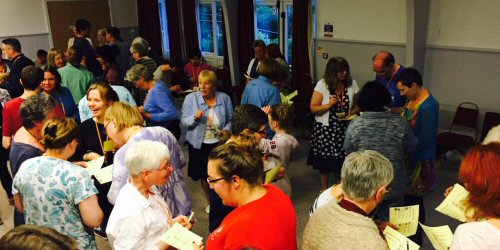The Hucklow Summer School Panel held a special meeting back in 2008 to consider our purpose and intentions. The following “mission statement” emerged from this meeting and gives an outline of our priorities.
The core activity of Hucklow Summer School is Religious Education.
• By “religious” we mean that our activities are focussed on matters of religion and spirituality. (i.e. we are generally not intending to provide training on matters of leadership/governance or teaching of a sort which is widely available in secular/mainstream educational institutions.)
• By “education” we mean that our activities draw out and develop the potential of all participants. (i.e. our emphasis is generally on activities which encourage participants to take an active part in exploration of religious/spiritual matters rather than providing ‘instruction’ on any given theme.)
We aim to provide a balanced programme, offering a rich mix of core activities for both the “heart” and “head”, and a variety of optional sessions showcasing a range of activities which participants might “take home” and try out in their home congregations. We also ensure that there are plenty of opportunities for relaxed fellowship and fun during the week.
Small Group Activities are the central expression of Religious Education at summer school: each person attending HSS is expected to participate in a closed workshop group which meets for twelve hours over the course of the week. This is intended to give each participant a direct experience of a small group run in accordance with best practice. These small groups are at the heart of summer school and provide a safe environment for deep exploration and personal relating.
Morning Theme Talks are another key element of HSS: a series of five talks, each lasting about an hour, relating to the overarching theme of the week. These talks provide a contrast in style to the small group activities, stimulate dialogue on religious and spiritual matters, and allow participants to engage with the topic on an intellectual level.
HSS is also committed to providing opportunities for Daily Spiritual Practice: meditation sessions each morning and worship in the chapel each evening are a vital element of the week. We hope that the depth and integrity of the summer school experience will prove valuable to all participants in their ongoing personal spiritual journeys.
Another essential feature of HSS is the provision of a worthwhile Programme for Children and Young People.
It is our intention that HSS should be organised and run in a professional manner. It is essential that HSS is a safe and caring environment. To this end, we are committed to provision of a named “Minister of the Week” for pastoral care, and to the widespread use of group covenants which help to maintain a safe space during our main small group activities. There are also a number of clear holding structures for the week, including a carefully planned and balanced timetable, and a formal support structure for the supervision of small group facilitators.
It is our hope that participants will be inspired and challenged by their experience of HSS to develop and promote religious education activities back in their own congregations and communities. For this reason, we aim to model best practice in all aspects of HSS, and hope that it will set a good example to those who go on to initiate activities in other settings. We actively encourage participants to offer activities at summer school, in the optional afternoon and evening sessions, and consider this to be an important part of developing our religious educators and community leaders of the future.
We aim to promote diversity at HSS, representing the breadth within our movement, in terms of our demographics, theologies and varied forms of spiritual practice. Summer School brings fellow Unitarians together and allows them to get to know each other deeply and form lasting and meaningful connections. We have set a target of one-third of participants in each year being newcomers to summer school (particularly reaching out to ministerial students and ministers who might attend as part of their continuing professional development), and have managed to meet that target for some years, yet we also value those returning participants who generously share their skills and enthusiasm to help run HSS and maintain its ethos.
Finally, we hope that participants feel a sense of commitment to a very special community of friends for the duration of the week that they are at HSS, and that summer school can serve as a blueprint for a spiritual community.
